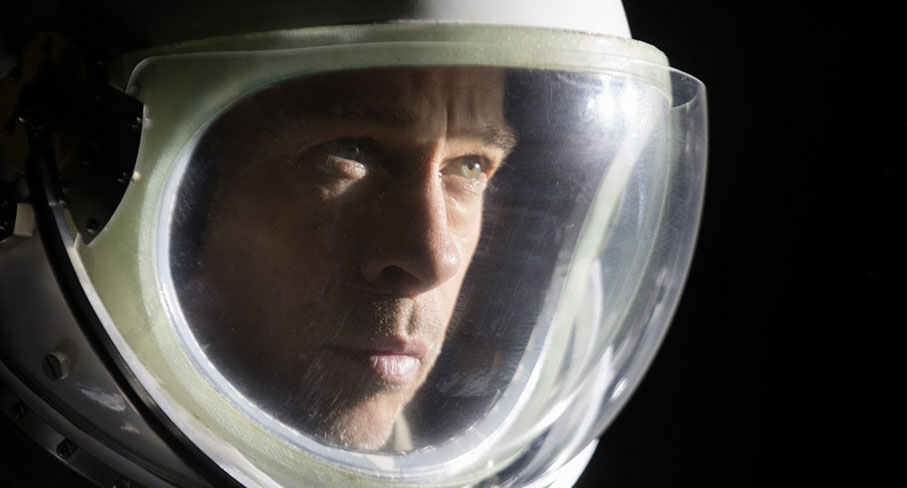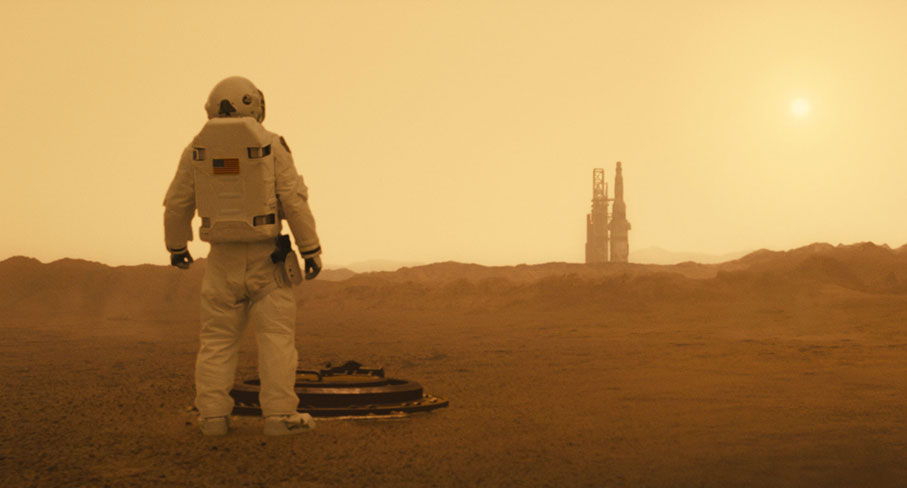| |
"...to make a science fiction movie that was very much a myth of man, not a myth of the gods. So that was the idea but you never know how much of that comes across, talking all this highfalutin bullshit, and then, of course, you hope the thing makes some shred of sense." |
| |
Director James Gray, Sight and Sound Interview, October 2019 |
Intelligence seems to have been devalued even more than the British pound in recent years. This gradual decline in respect for brainpower reached a depressing nadir hearing Michael Gove (a Christian right wing politician and Brexit supporter) say in an interview "people in this country have had enough of experts..." Even giving the man the benefit of the doubt (experts in inverted commas perhaps?) it was an unfortunate statement. Intelligence in movies doesn't mean films about Albert Einstein but layers upon layers of meaning and nuance even in the most ambitious projects. There's no denying the scope of Ad Astra (literally Latin for 'to the stars' not a Vauxhall car commercial; the title Interstellar was already taken). It's a beautifully crafted film with a no nonsense functional grandeur in its visual effects and a rock solid central performance by an ever increasingly impressive Brad Pitt. The ease, alcoholism and laconic cool of his character in Once Upon A Time In Hollywood is replaced here by a buttoned down, emotionally compartmentalising Jock whose heart rate never strays above 80 beats per minute. He is the ultimate astronaut and very much a shell of a human being. Pitt's performance is surprisingly good. Quietly moist eyed when necessary and emanating steely determination when situations go south, Pitt assuredly anchors the film and may well be in every scene. He has a quality that I admire enormously in actors, that of stillness. Like the camera's loving and harrowing devotion to Jennifer Lawrence in mother! James Gray's camera is more often than not on Pitt's face and apart from the actor's ridiculous handsomeness, his subtle communication is never less than commanding. However, he has significant help from himself in another way.

Like Willard in Apocalypse Now!, Pitt's character Roy McBride provides a voice over throughout. This was a risky move. Whereas I cannot imagine Apocalypse Now without Martin Sheen's superbly written and performed voice over, the technique has fallen into clichéd disrepute. But here it works because it comes through as an extended psychological evaluation that he's forced to take on himself (a necessary chore he has to practically perform many times in the film) so even though we are getting thoughts verbalised, they are somehow an important thread of the whole fabric and you tend to forget the voice over's intrusion as it's so artfully folded into the mix. The Coppola classic is not only referenced in this way. How's this for a synopsis... Notice any similarities? An astronaut has gone rogue at the edge of the galaxy and his malfunctioning anti-matter engine is throwing out powerful electrical surges that are impacting on Earth so much so that all life is threatened (yeah, I know. Not a great MacGuffin but there it is). A fellow astronaut is recruited to make contact with the troublemaker who will then be 'terminated with extreme prejudice'. OK, not those exact words but Ad Astra is very much an interior Heart of Darkness where one man, and in some sense 'everyman', comes under the microscope. Pitt's journey is perilous with many exhilarating and dangerous encounters along the way. The sting in this tale is that it's a son reaching out to a believed dead father, a son who thought his father had wilfully abandoned his family destined as he was to get to the edge of the galaxy and search for extraterrestrial life. Tommy Lee Jones plays the older astronaut with wrinkled gravitas and adds his charisma and experience to a film quite unlike most science fiction epics based in space. Without question, space itself is a major character, a literal star-studded expanse into which we can emboss myth and profundity. Nothing mutely screams out our paltry insignificance more than the final frontier and what is a man in the universe but a biological speck of virtually nothing. And what wonders those virtually-nothings can perform.
The near future is wholly and horribly recognisable. The moon (as in Futurama) is just a capitalist amusement park with all the name brands in place. I wonder if the contributing companies were shown the script. On arriving on the moon, Pitt wonders aloud that if his father were to see this crass commercialisation, he would have torn it all down. There follows a moon buggy chase (apparently the moon is mostly a lawless wasteland away from the central Tycho moon base with miners pirating spare parts and looting when given the opportunity). I loved the little 2001 nod there. The Tycho crater was where the moon monolith was discovered. Pitt is to travel on to Mars where he will attempt to communicate with his father who may or may not be alive on a ship orbiting Neptune. After a short rescue mission, a tremendous and shocking detour from the main narrative, he gets to Mars and does what is required of him. But his relationship with his father is deemed too compromising and he's sent back to Earth once his job is done. Well, we all know that's not going to happen, right? To say more would be uncharitable of me.
The effects work is absolutely first rate with realism to the fore and 2001 nods all over the place. The sense of authenticity is never far away with Gray taking full advantage of his widescreen frame and ignoring the needs of the DVD generation in terms of actually being able to see ships and astronauts in wide shots in that standard format. I loved the fact that high quality Hasselblad photos of the real moon were used to simulate moon surfaces in the buggy chase. Max Richter's score is impressive and reminded me early on in the film of Manhunter's electronic soundscapes. I've played Richter's string-heavy portentous main theme to death as is my wont (it's coolly effective) but the full score is not available yet. Hoyte van Hoytema's superb cinematography echoes Roger Deakins' work on Blade Runner 2049 with colour palettes and colour bleeds for each location. He wisely and simply lets space be space. He has form in this genre having shot Interstellar for Christopher Nolan.

The supporting cast is terrific given the little screen time each manages to claim as their own. Donald Sutherland is an ex-astronaut pal of Pitt's father charged with getting Pitt to Mars. His plot explanations reminded me of his brilliant scene-stealing cameo in JFK. Liv Tyler plays Pitt's estranged wife who cannot get through to him. Some have suggested she's wasted in an almost totally mute role but I disagree. You need someone with her specific presence to be the focus of Pitt's interior life. Ruth Negga plays the daughter of astronauts killed in action and understands Roy's needs to see his own personal mission through. A little bit of the ridiculousness of American politics collided with the movie. NASA is curiously absent throughout the film. I've not been able to find out why. In its place is the less well-known, once dissolved 'U.S. Space Command'. Well it was relatively inactive while in production and then chief clown president decides to re-establish it in the summer of this year to bolster himself of course. Director Gray was not happy about that odd coincidence. Nor was he thrilled when Disney gobbled up Twentieth Century Fox but the movie survived the takeover.
If I have any quibbles, the exciting and scientifically accurate moon buggy chase is rendered a little superfluous. The technology existed to put Pitt anywhere on the moon despite all the stuff about it being 'like the Wild West out there...' and therefore having to drive the final miles to the launch site of the Mars-bound rocket seemed unnecessary. Maybe it was security but it seems only included because the centre of the film needed an action sequence. But it's a small concern. There's always the movie-nullifying idea of Brad just recording his lines to his father and then those recordings can travel to Mars so much faster than the man could. There's also the scary technology born a few years ago that can put any words into anyone's mouth digitally... Fifteen or so minutes from the end, I had this extraordinary feeling that Brad was about to homage John Carpenter's Dark Star. See the film to find out why. Despite all the scientific accuracy (I'm no Brian Cox), the film's denouement features a real old chestnut that even the layman/woman would question but by then you are too emotionally engaged to care. If something blows up in space there are no shockwaves - shockwaves depend on air for their existence as far as I'm aware – there's just debris infinitely moving horrifically fast in all directions. Still, it's a movie and movies should be given some latitude, especially movies as smart (except for the shockwaves) and affecting as this one. For a thrilling and thoughtful two hours in the company of an actor whose stature is only growing, Ad Astra comes well recommended. |